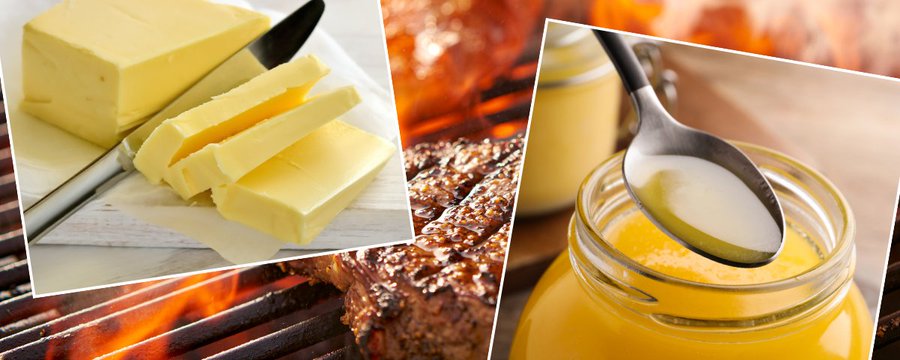
Tłuszcz zwierzęcy kontra tłuszcz roślinny: co naprawdę mówi nauka (i twoje ciało)
Udział
Rodzaj tłuszczu, na którym gotujesz, stał się w jakiś sposób tematem kontrowersyjnym – czymś, co wywołuje debaty przy stole i dzieli społeczności żywieniowe. Niektórzy święcie wierzą w oliwę z oliwek i awokado, podczas gdy inni idą na całość z masłem, łojem i ghee.
Czy więc tłuszcz zwierzęcy jest rzeczywiście dobry dla zdrowia? A może to droga w jedną stronę do chorób serca?
W Biohackers Corner mniej interesują nas dogmaty, a bardziej to, co mówią badania naukowe – i dane ze świata rzeczywistego. Przyjrzyjmy się faktom dotyczącym tłuszczów zwierzęcych i roślinnych, abyś mógł podejmować świadome decyzje i wziąć odpowiedzialność za swoje zdrowie metaboliczne.
Krótkie podsumowanie: tłuszcze zwierzęce a tłuszcze roślinne
Ludzie spożywają dwa główne rodzaje tłuszczów: tłuszcze zwierzęce i roślinne . Oba odgrywają rolę w odżywianiu, ale ich struktura, funkcje i wpływ na zdrowie są bardzo różne.
🥩 Tłuszcze zwierzęce
Tłuszcze zwierzęce pochodzą – jak się domyślasz – od zwierząt. Należą do nich:
Łój (wołowy/jagnięcy)
Smalec (wieprzowy)
Szmalc (z drobiu)
Masło i ghee
Oleje rybne
Najważniejsze cechy:
- Zazwyczaj zawierają więcej tłuszczów nasyconych , więc w temperaturze pokojowej mają większą tendencję do przyjmowania stanu stałego.
- Zawierają witaminy rozpuszczalne w tłuszczach , takie jak A, D, E, K i B12 — często w formach biodostępnych.
- Może zawierać sprzężony kwas linolowy (CLA) , który wspomaga zdrowie tętnic i redukuje płytkę nazębną.
- Mają krótszy okres przydatności do spożycia niż oleje roślinne — jednak tradycyjne metody przygotowania, takie jak klarowanie lub wytapianie, mogą go wydłużyć.
Bonus: Tłuszcze pochodzące od zwierząt hodowanych na pastwiskach i tuczonych trawą zawierają znacznie więcej składników odżywczych i mniej związków zapalnych.
🌱 Tłuszcze roślinne
Tłuszcze roślinne pochodzą z nasion i warzyw, takich jak:
Olej rzepakowy
Olej sojowy
Olej z pestek winogron
Olej słonecznikowy
Olej kukurydziany
Najważniejsze cechy:
- Zawierają dużo tłuszczów nienasyconych , szczególnie omega-6 — zwykle są płynne w temperaturze pokojowej.
- Często ekstrahuje się je chemicznie, stosując wysoką temperaturę, rozpuszczalniki i środki wybielające.
- Długi okres przydatności do spożycia, ale podatny na utlenianie i degradację składników odżywczych .
- Może to być „zdrowe dla serca” w kontekście marketingu, ale badania są... mniej jasne.
Co badania naprawdę mówią o tłuszczu i zdrowiu serca
Przez dekady tłuszcze nasycone pochodzenia zwierzęcego były potępiane – obwiniane za wszystko, od zatykania tętnic po zawały serca. Jednak ta narracja szybko się rozpada.
Nowe badania zmieniają sytuację, sugerując, że tłuszcze zwierzęce mogą mieć działanie ochronne , podczas gdy wysoko przetworzone oleje roślinne mogą być ukrytą przyczyną przewlekłych chorób.
📚 Dowody mówią same za siebie
- Badanie MARGARIN wykazało, że osoby spożywające duże ilości kwasu linolowego (omega-6 występującego w olejach roślinnych) miały zwiększony poziom fibrynogenu , który zagęszczał krew i zwiększał ryzyko powstawania zakrzepów.
- Wysoki stosunek kwasów omega-6 do omega-3 wiąże się obecnie ze zwiększonym stanem zapalnym , agregacją płytek krwi i większym ryzykiem sercowo-naczyniowym niż sam wysoki poziom LDL.
- Oleje z nasion sprzyjają stresowi oksydacyjnemu , insulinooporności i przewlekłemu zapaleniu — a wszystkie te czynniki są prekursorami chorób metabolicznych.
A co z tłuszczami nasyconymi?
Okazuje się, że obawy dotyczące tłuszczów nasyconych opierały się raczej na słabych korelacjach niż na mocnych dowodach. Nawet jeśli potraktujemy te obawy poważnie, większość tłuszczów zwierzęcych zawiera kwas stearynowy – rodzaj tłuszczu nasyconego, który wykazuje działanie:
- Obniż ciśnienie krwi
- Obniża poziom cholesterolu LDL
- Wspomaga pracę serca
- Możliwe zmniejszenie ryzyka zachorowania na raka
Czy tłuszcz zwierzęcy jest dobry dla Ciebie?
Jeśli nas pytasz – absolutnie. Ale nie wierz nam na słowo. Badania mówią same za siebie, a co więcej, twoje ciało może być najlepszym laboratorium ze wszystkich .
Tłuszcze zwierzęce:
- Zawierają pełnowartościowe białka (np. wołowinę), które pomagają regulować poziom cukru we krwi i zmniejszają łaknienie.
- Są mniej prawdopodobne w żywności wysoko przetworzonej , która szkodzi zdrowiu metabolicznemu.
- Dostarczaj składniki odżywcze, które Twój organizm faktycznie rozpoznaje i może efektywnie wykorzystać.
Tłuszcze roślinne nie są same w sobie złe — oliwa z oliwek tłoczona na zimno , olej z awokado i olej kokosowy mogą przynieść znaczące korzyści, zwłaszcza spożywane z umiarem i minimalnie przetworzone. Ale co z olejami z nasion? Tu sprawa staje się niejasna.
Wypróbuj sam: Przeprowadź eksperyment N = 1
Chcesz dowiedzieć się, jak naprawdę reaguje Twój organizm? Oto Twój protokół:
1. Wykonaj podstawowe badania krwi — pełny panel lipidowy, insulinę na czczo, hs-CRP, trójglicerydy.
2. Zrezygnuj ze wszystkich olejów roślinnych na 30 dni. Używaj łoju, masła, ghee, oliwy z oliwek lub oleju kokosowego.
3. Powtórz badania laboratoryjne pod koniec miesiąca.
Wielu biohakerów zgłasza niższy poziom trójglicerydów, wyższy poziom HDL, więcej energii, a nawet czystszą cerę.
Jeśli nie masz pewności, jakie markery krwi zbadać, zapoznaj się z naszym Przewodnikiem po badaniach laboratoryjnych w zakresie zdrowia metabolicznego — znajdziesz w nim wszystko opisane krok po kroku.
Ostatnie myśli
Niezależnie od tego, czy stosujesz dietę paleo, mięsożerną, ketogeniczną, czy po prostu próbujesz uciec od pułapki przetworzonej żywności, wysokiej jakości tłuszcz jest podstawą twojej biologii.
W Biohackers Corner opowiadamy się za mądrością przodków, niezależnym myśleniem i suwerennością metaboliczną. Oznacza to wybieranie źródeł tłuszczu bliższych naturze – a nie kominów fabrycznych i beczek po oleju roślinnym.
Ponieważ odzyskanie zdrowia zaczyna się od tego, co kładziesz na talerz.
